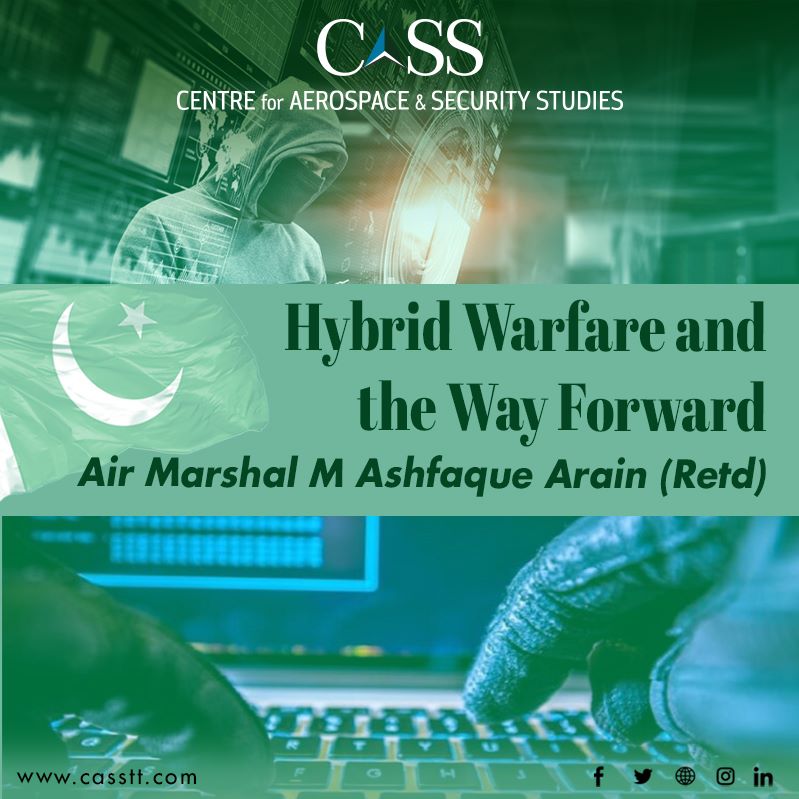‘Hybrid’ warfare, as the name implies, is a product having mixed character of two or more elements. Initially, it referred to employment of irregular forces and non-state actors with military capability. After the 2006 Lebanon-Israel war, which saw Hezbollah employing guerilla warfare along with innovative use of technology and effective information campaign, Frank Hoffman used the terms ‘hybrid threat’ and ‘hybrid warfare’ to explain application of multiple, diverse tactics simultaneously against an opponent. In the absence of an agreed upon term, numerous terms such as ‘hybrid threats’, ‘hybrid influencing’, ‘hybrid adversary’, ‘non-linear war’, ‘non-traditional war’, ‘special war’, ‘grey zone’ and ‘unrestricted warfare’ are in use by militaries and academia in different countries. However, the term ‘Fifth Generation Warfare’ being all about ‘information and perception’ with dependence on non-kinetic means such as social engineering, misinformation, cyberattacks etc. can be applied in support of hybrid warfare but does not provide an alternate term.
Hybrid warfare relies on provoking historical, ethnic, religious, socioeconomic, and geographic differences or fault lines in a society. Its tools include proxy warfare, information warfare, propaganda, terrorist activities, political and diplomatic coercion, economic strangulation, cyber warfare, social engineering, misinformation and lawfare etc. The aggressor also endeavours to leverage influence over international actors and institutions through diplomatic efforts. However, all these are spearheaded by intelligence systems.
Perpetrators of hybrid war use multidimensional infiltration into enemy systems with an aim to demoralise, destabilise and disintegrating the adversary with an underlying intent of controlling or influencing the latter into compliance. The infiltration creates divisions and polarisation in the population, psychologically undermines decision-making capabilities, and systematically cripples financial and information networks. Result of the combined effects of these efforts is catastrophic for the target nation. In other words, such warfare is a struggle fought in familiar and unfamiliar battlefields, from the virtual realms of cyberspace to the minds of people. It has a peculiar nature and various elements interact at different levels. Offender exercises the ability to control its levels, apply the elements singly or in different combinations to manipulate intensity according to dictates of the situation. Since it is a centrally designed and controlled application of various covert and overt tactics, overall result is always greater than the sum total of all the elements. Hybrid adversaries, however, endeavor to keep the constituents separate to avoid connectivity and evade attribution and legal implications. Additionally, during application of hybrid war, the aggressor maintains a robust defence posture to avert any response.
Hybrid warfare is not a new concept. Intelligence, propaganda, disinformation, economic strangulation, and subversive activities have been used in the wars for long. New technologies in the information age have, however, added a new dimension and made it much more effective and attractive. Unacceptably high cost of personnel, material and resources in modern wars has also made hybrid warfare a more attractive option.
Like many other states, Pakistan also has many vulnerabilities; important ones being identity conflict, ethnic and sectarian divide, unequal economic opportunities, political instability, weak or non-functional institutions etc. These have been further aggravated by poor governance, failure to implement rule of law and provide justice to the aggrieved.
While enemies would always exploit our fault lines and vulnerabilities, it is our responsibility to defend our national interests. Unfortunately, the very leadership which was responsible to make and implement visionary policies to reduce vulnerabilities, has wittingly or unwittingly acted as a catalyst to widen the divide. Successive leadership, instead of bridging the gaps through negotiations, dialogue and mutual accommodation, have further exacerbated the divisions through shortsightedness, rigidity and indiscriminate use of force. Such tactics, while temporarily successful, caused long term differences.
Repeated failures have put Pakistan’s national security, social cohesion, economic well-being, culture, and political stability etc. at risk. It therefore becomes extremely important for the government and all the state institutions to carefully study past and assess current challenges to understand the threat and its implications for the state. It is suggested that all stakeholders should be brought on board to make policies and strategies aimed at effectively responding to the entire spectrum of hybrid warfare. Concurrently, efforts must be made to counter exploitation of these vulnerabilities by the external forces and their domestic sympathizers. The policies must also aim to safeguard our national interests, ensure state stability while remaining globally competitive and politically relevant in the evolving geopolitical environment.
Areas requiring immediate attention include sustained development for a strong economy, revamping the education system, creating religious, ethnic and interprovincial harmony, an effective legal and judicial system, realigning our foreign policy to changing geostrategic realities, creating awareness for leadership and masses about the threat, effective use of media, social media, academia and think tanks, exploring legal options and development of a national narrative.
Since no policy can be sustainable without public support, the state and all its institutions should endeavor to draw strength from the citizens. As the enemy endeavours to provoke and exploit our vulnerabilities, there is a need to display visionary leadership to resolve the differences instead of compounding them with shear arrogance and disdain. Resorting to policies which did not yield desired results in the past, will only be akin to reinforcing failure.
The author is a retired Air Marshal of the PAF who served as Pakistan’s Air Advisor at New Delhi from 2002-06, presently working as Director Technologies and International Cooperation at the Centre for Aerospace & Security Studies, Islamabad, Pakistan. The article was first published in The Nation. He can be reached at cass.thinkers@casstt.com




